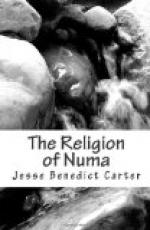By this time the myths which Greece had given to Rome or which Rome had made for herself on Greek models were absolutely a part of the national past. These too entered into Augustus’s scheme. Thus another protege of Maecenas, the poet Propertius, was gradually weaned from love poetry and filled instead with a hunger for the myths of Roman temples and of old Roman customs, so that Cynthia slowly gives way to Tarpeia and Vertumnus, and the Rome of Augustus to the Rome of Romulus. Even the irrepressible Ovid tried in his exuberant fashion to assist in this work and started in his Fasti to write a history of the religious festivals of the Roman year. But above all these, and infinitely more important in its influence, towers the Aeneid of Virgil. All through the varied incidents of the twelve books there runs the scarlet thread of a great purpose, the glorification of Rome and of Augustus. From the sack of Troy, through the long wanderings and the fierce wars in Latium, down to the final conquest of the enemy, we see Aeneas led by the hand of the gods whose will it was that Rome should be. The lesson is very evident. The providence which guided us in the past still protects us; we have no right to be discouraged, and our future is assured us under the same gods who brought our fathers out of the land of the Trojans, through the midst of the Greeks. But there is concealed in the Aeneid another lesson, much more directly useful to Augustus. Its hero, the immaculate pious Aeneas, is the direct ancestor of the Julian house to which Augustus belongs, and the founding of Rome shows not only the good will of the gods toward the city, but in no less degree their special appointment and protection of the leader. The descendants of the house of Aeneas are therefore the divinely appointed rulers of Rome.
There can be no question but that this poetry had an effect none the less far reaching because its influence was difficult to estimate and analyse. It was not necessary for the psychological result that men should actually believe in these myths; much was gained if they allowed their thoughts to dwell on the ideas presented in them. It was the sedimentary deposit thus formed which was to fertilise the soil of patriotism which had grown so barren in the civil wars. But while Augustus was broad-minded enough to realise the value of the influence of literature, he did not fail to recognise that men could not live by myths alone, that they must be surrounded by visible cult acts and tangible temples of the gods in order that their faith might be aided by sight and their life filled with action. Literature was to encourage patriotism, and patriotism was the foundation for the spiritual restoration of the state religion, but the state itself must by legal enactment prepare the outward form which the religious activity was to take. The question of the sincerity of Augustus in these religious reforms is a very difficult one to answer.




